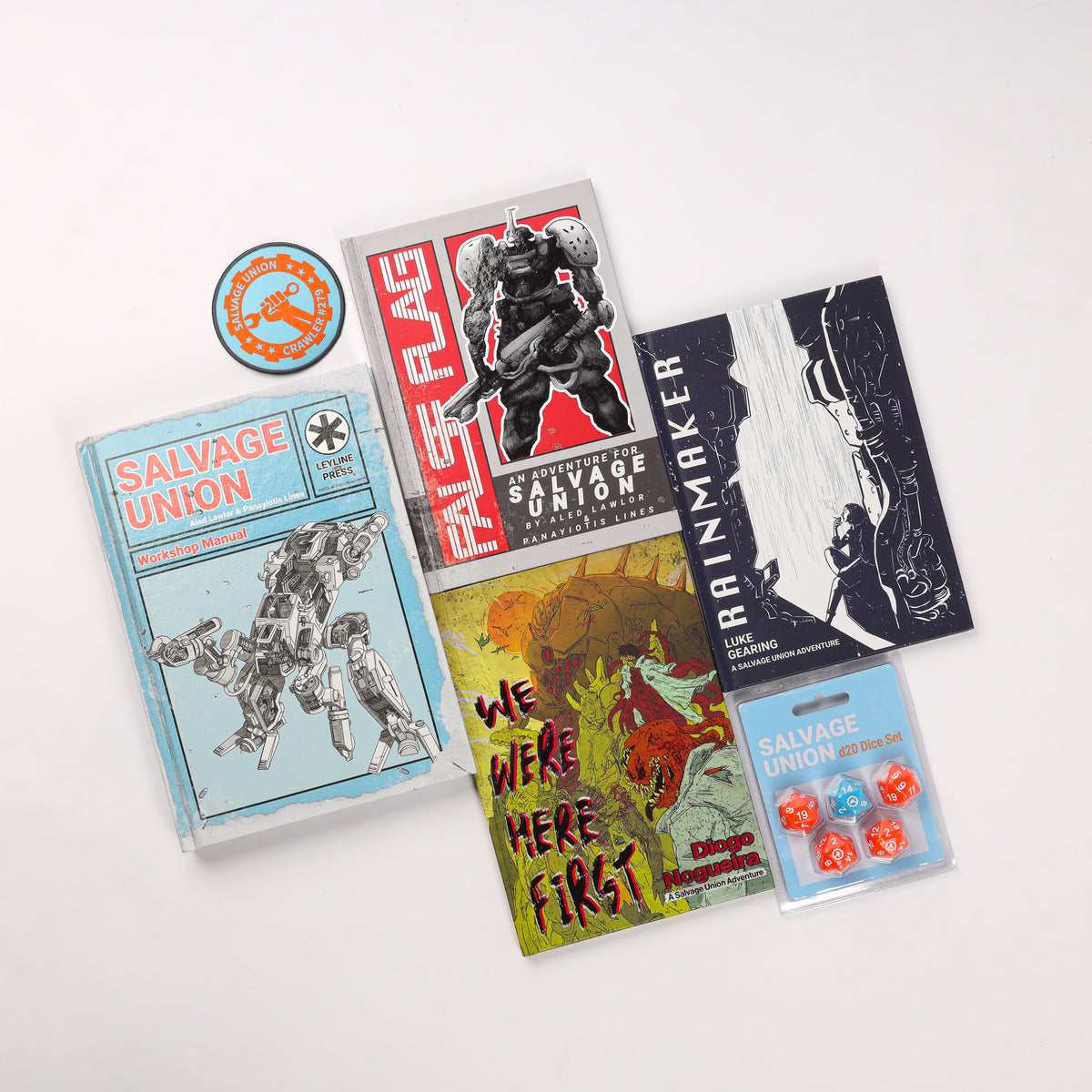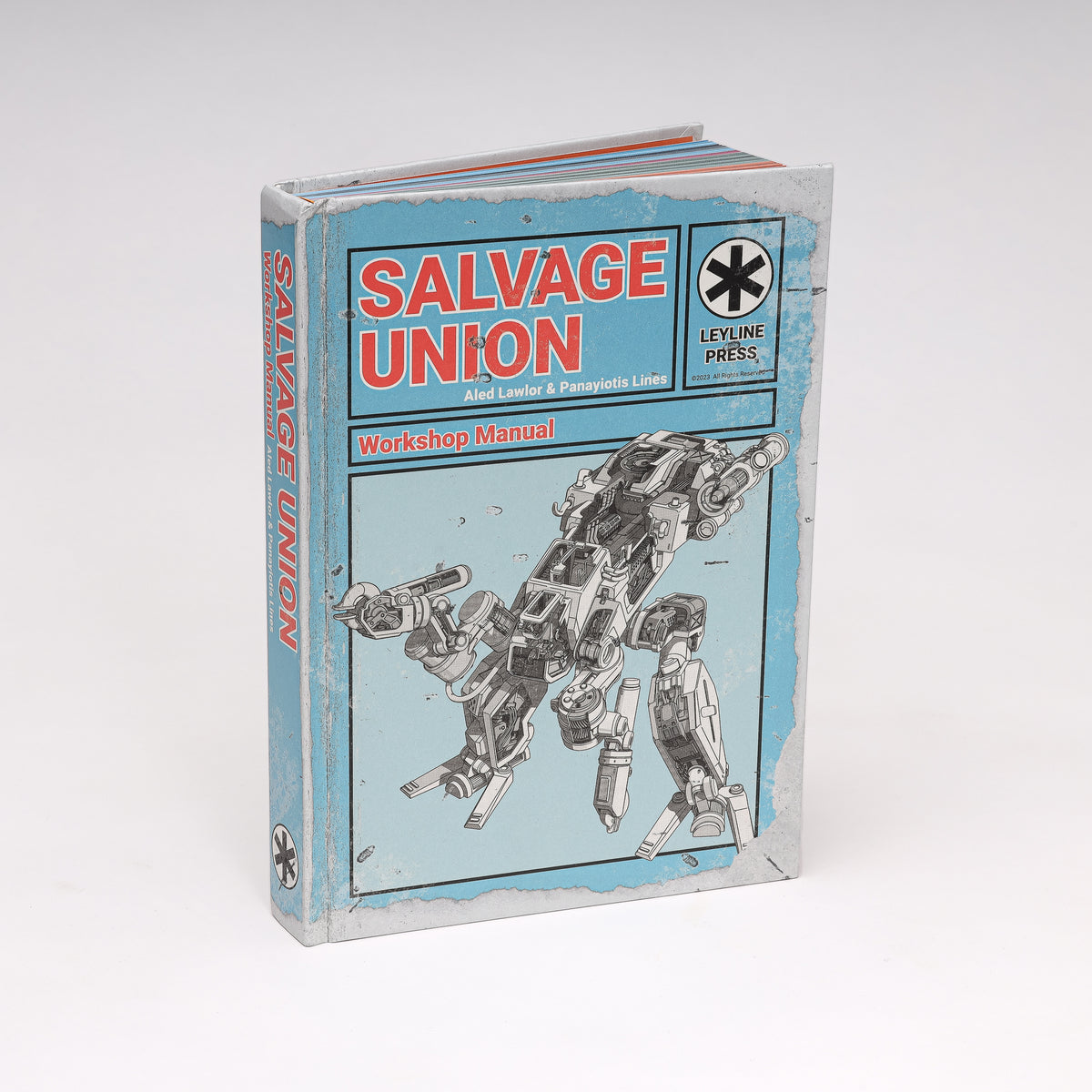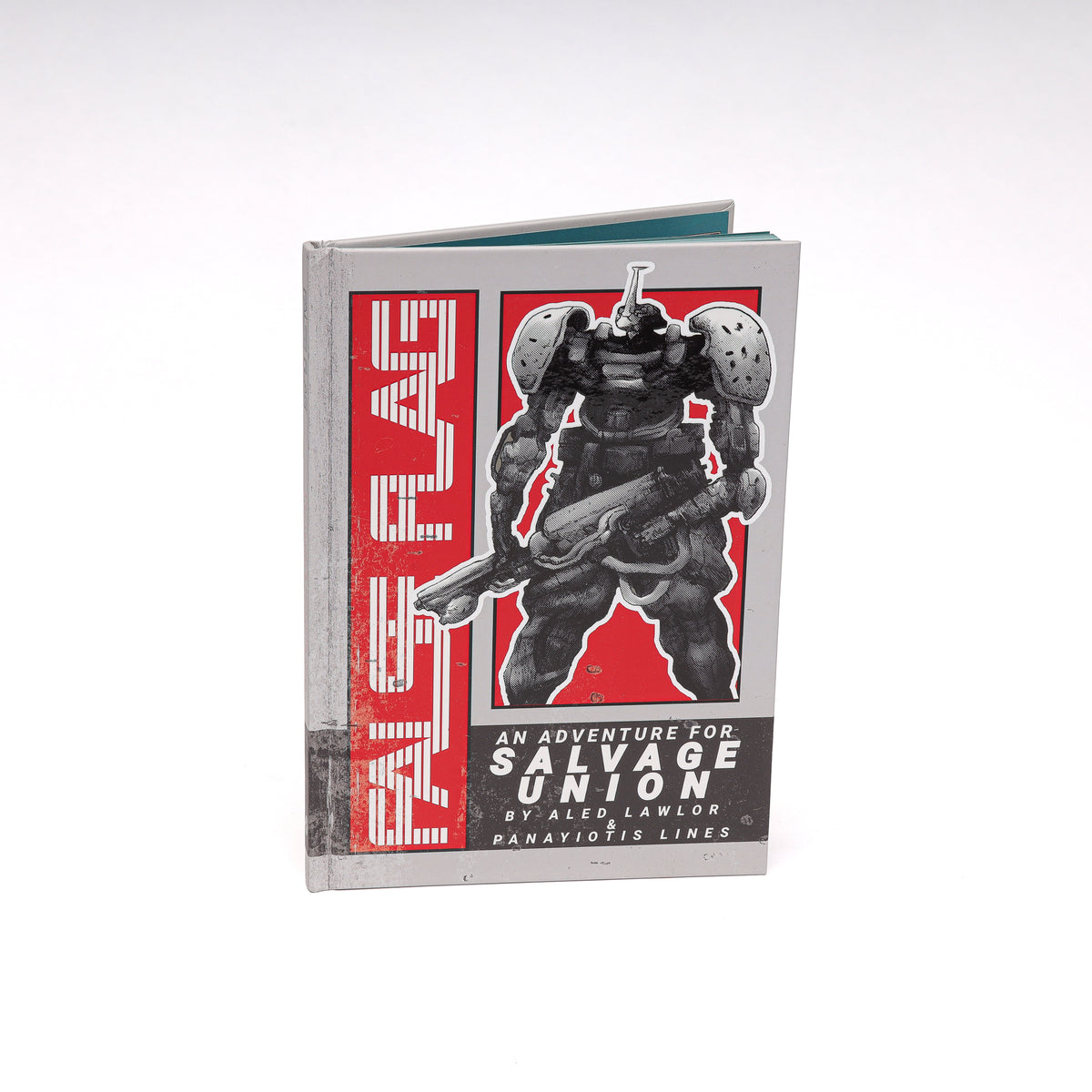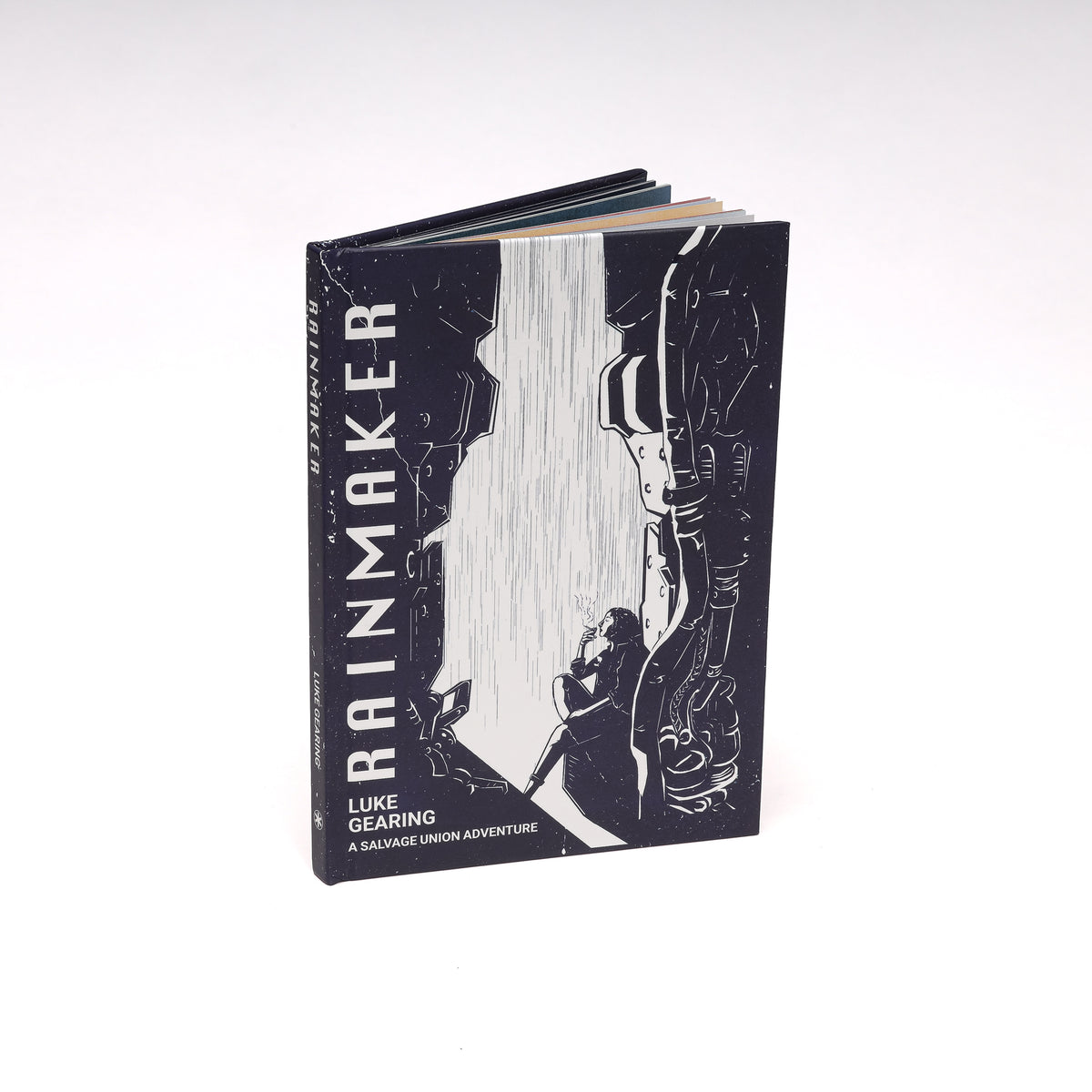This is the first in a series of tabletop RPG design blogs where we’re going to be discussing the design and development of Salvage Union.
Salvage Union is a post-apocalyptic mech tabletop roleplaying game powered by the Quest RPG. It's currently available to buy here.
Salvage Union is a 'hack' of a fantasy TTRPG called Quest and in this blog we're going to discuss what Quest is in lead up to explaining why we decided to use it for Salvage Union.
Quest is a fantasy adventure tabletop roleplaying game developed by The Adventure Guild. Quest was developed as an accessible and player friendly game to introduce new players to roleplaying. Its easy to learn rules set allows the game to be focussed around narrative and story telling decisions.
TC Sottek the designer of Quest created the first draft of the game in one evening. He wanted to create a system in which you could actually do the memorable things that he was seeing players do within the likes of live play streams and actual play podcasts.
In an interview with Dicebreaker which you can read here he says -
“The goal early on was to create a system that helped people have an epic fantasy experience like the ones they were hearing on popular shows,” he says.
This points to an interesting dichotomy between how many people are exposed to roleplaying games in this day and age and the reality of some of their rules sets. Streams and actual play podcasts will often circumvent, ignore or simply make up rulings for situations when the rules don't fit. Indeed the term ‘rule of cool’ was popularised by Critical Role. If you were to sit down and play many of the games in the market RAW you often get a different experience to what is shown in streams.
TC Sottek wanted to change that and purposefully designed the game so that it was a lot simpler to recreate those memorable scenes by following the rules of the game itself. This comes through in the writing where the crunchy and often clinical ‘legalise’ style of many tabletop RPG's was replaced with a friendly, conversational tone which pervades Quest.
To break this down into mechanics the rules Quest provides a simple and clean mechanical basis to run freeform and narrative based play that flows like a conversation.
You can watch an actual play of Quest by the Dicebreaker team to get an idea of that here.
Mechanically Quest runs off of a core, universal d20 variable resolution mechanic.
Characters you play within the game do not have stat bonuses or modifiers and there’s no way to get such bonuses in play. There’s not even an ‘advantage’ mechanic. Instead any action you take is resolved by simply rolling a d20. There are five possible results to this that range from Triumph - Success - Tough Choice - Failure - Catastrophe. This core resolution mechanic is intended to represent fate, fortune, luck and various other extrinsic factors and does not represent character skill.
Characters are defined not by their stats but by their role and the abilities they grant. Each of the 8 character classes, which range from Fighter, to Doctor, to Wizard to Spy, have a set of abilities. These are activated by spending Ability Points. Characters start with 10 Ability Points which regenerate after a long nights rest. Abilities are unique to each class and have numerous punchy and evocative effects. The Fighter can charge into foes by spending 2 Ability Points which knocks them all prone and stuns them. The Ranger can choose to automatically hit a foe by spending 3 Ability Points. The Spy can spend an ability point to impress common folk by pretending to be someone notable, which requires the entire group to make up claims about them and draws the attention of everyone around.
The caster classes such as The Invoker and Wizard can also initiate various more familiar magical effects such as sending magical messages, summoning illusory creatures and making magical attacks. However all classes effectively work in the same manner and get access to a wide range of interesting abilities which allow players spotlight moments and to alter the flow of the game and story.
Whilst some of these abilities ask for a die roll many of them just happen automatically, some are combat based but many are utility or information based encouraging The Guide (GM) of the game to be permissive about what the player characters can do, be open about information and share narrative control with the players.
The combination of the core mechanic along with player activated abilities forms the core of Quest. Damage is static and within the game everything effectively does 2 HP on a hit with all player characters having 10 HP and NPC’s either having 2, 4 or 10 HP depending on if they are a ‘Commoner’, ‘Minion’ or ‘Boss.’ Combat is in rounds but there’s no initiative and it’s left as a freeform exercise for The Guide (GM) and group to adjudicate together.
In practice during play the light and freeform nature of the game combined with its variable core mechanic and permissive abilities does exactly what the designer wanted, it creates games that are far more focussed on the players having agency to describe what they want to happen within play and see the story emerge and develop as the game progresses whilst being forced to make tough choices and deal with failure. This all makes for the type of exciting play that you would typically see within actual play streams and podcasts but brings them to the table with you and your friends.
That about sums up Quest. In the the next blog we're going to answer a question we get a lot which is 'Why Quest?'
You can pick up a copy of Quest here - https://www.adventure.game/
Interested in playing Salvage Union?

Salvage Union is now available to buy here.
You can download the free QuickStart here - https://leyline.press/products/salvage-union-beta-quickstart-digital-edition-pdf
You can pre-order Salvage Union here and immediately get the Core Book PDF.
You can follow the Salvage Union Kickstarter here.
You can join the Salvage Union Discord here - https://discord.gg/gmM6jTT8qm
Follow Salvage Union on Twitter - @salvageunion
Follow Salvage Union on Instagram - @salvageunion
Subscribe to the Leyline Press newsletter here to receive updates Salvage Union and our other games.













3 comments
This was one of the best and most concise explanations of Quest that I’ve come across. Better than the official website, in my humble opinion. Thank you for putting this together.
I’m excited to try this out. I hadn’t heard of Quest before backing Salvage Union. It’s an interesting system that I like upon reading. Seems much more narrative based rather than crunchy, not unlike Burning Wheel. Very cool, thanks for the write-up!
Hi!
Thanks for the cool article about The Mecha Hack!
Can I translate it into Russian and publish it in my ttrpg blog?
Thanks for your time.